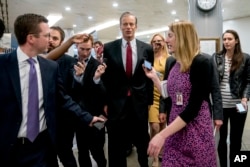U.S. senators adjourned late Thursday without voting on a bill to fund the government beyond Friday.
Senators will resume debate Friday morning on a bill passed by the House late Thursday on a vote of 230-197.
Lawmakers had two options: Agree to a one month, temporary spending measure, known on Capitol Hill as a continuing resolution (CR), or shut down the government until funding could be agreed on.
WATCH: Drive to Fund US Government Hits Immigration Speed Bump
Democrats withheld support for the bill, forcing negotiations between House Speaker Paul Ryan and the conservative House Freedom Caucus to ensure the bill would pass. House Freedom Caucus Chair Mark Meadows secured commitments for future votes on military funding and an immigration bill favored by conservatives.
“They’re going to whip it and help us get to 218,” House Freedom Caucus member Rep. Raul Labrador said of leadership’s commitments to bring his immigration bill, co-sponsored with House Judiciary Chair Bob Goodlatte, up for a vote. The bill includes a permanent legislative solution for the Deferred Action on Childhood Arrivals (DACA) program.
DACA recipients
In September, President Donald Trump ordered an end to the Obama administration program that shielded young undocumented immigrants who were brought to the U.S. illegally as children.
Congressional Democrats have pushed for the short-term spending bill to include a fix for the 800,000 DACA recipients, who will lose their protection from deportation March 5, unless Congress acts.
The temporary measure faces a tough road to passage in the Senate, where Republicans’ vote margins are much narrower. If the temporary measure is approved, lawmakers will use the next month to negotiate a spending package to cover the rest of fiscal 2018, which ends Sept. 30.
“Senator (Chuck) Schumer, do not shut down the government,” Speaker Ryan said to reporters after the bill passed, referring to the Senate minority leader. “We need to make sure our men and women in uniform get the resources they need so they don’t get the rug pulled out from under them.”
Eleven House Republicans voted against the spending bill, including Florida Representatives Carlos Curbleo and Ileana Ros-Lehtinen, who vowed to vote against any legislation that did not include action for DACA recipients.
A third issue that is part of the legislation is children’s insurance. Trump objected to a measure that would extend children’s health insurance for the next six years, which had largely Democratic support but was being supported by some Republicans as a means of getting the bill passed.
The spending package being voted on did not include enough military spending to please some Republicans, it had no protections for the Dreamers and its children’s insurance provisions were less than what Democrats wanted.
Senate action
After passage in the House, the Senate could hold its vote on the bill Friday.
But again, its passage is uncertain. Two Republicans have announced they will not support the measure, meaning the measure needs support from at least 11 Democrats to reach the 60 votes required to pass.
If the Senate fails to approve a stopgap measure, the government shutdown would occur at midnight.
The U.S. government has shut down before. The last time was in 2013, in a deadlock over health care policy. The shutdown lasted 16 days and furloughed hundreds of thousands of federal workers.
What stops and what continues during a federal shutdown varies, but federal research projects could be stalled, national parks closed, tax refunds delayed, processing of veterans’ disability applications delayed, and federal nutrition programs suspended, as was the case in 2013.
The government has officially shut down 18 times since 1976, when the current federal budgeting process was instituted.
VOA's Michael Bowman on Capitol Hill contributed to this report.








